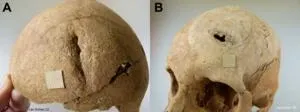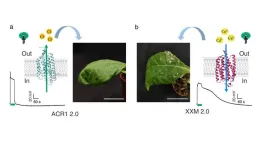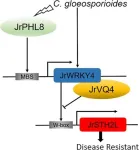Bacterial cells can “remember” brief, temporary changes to their bodies and immediate surroundings, a new Northwestern University and University of Texas-Southwestern study has found.
And, although these changes are not encoded in the cell’s genetics, the cell still passes memories of them to its offspring — for multiple generations.
Not only does this discovery challenge long-held assumptions of how the simplest organisms transmit and inherit physical traits, it also could be leveraged for new medical applications. For example, researchers could circumvent antibiotic resistance by subtly tweaking a pathogenic bacterium to render its offspring more sensitive to treatment for generations.
The study will be published Wednesday (Aug. 28) in the journal Science Advances.
“A central assumption in bacterial biology is that heritable physical characteristics are determined primarily by DNA,” said Northwestern’s Adilson Motter, the study’s senior author. “But, from the perspective of complex systems, we know that information also can be stored at the level of the network of regulatory relationships among genes. We wanted to explore whether there are characteristics transmitted from parents to offspring that are not encoded in DNA, but rather in the regulatory network itself. We found that temporary changes to gene regulation imprint lasting changes within the network that are passed on to the offspring. In other words, the echoes of changes affecting their parents persist in the regulatory network while the DNA remains unchanged.”
Motter is the Charles E. and Emma H. Morrison Professor of Physics at Northwestern’s Weinberg College of Arts and Sciences and director of the Center for Network Dynamics. The study’s co-first authors are postdoctoral fellow Thomas Wytock and graduate student Yi Zhao, who are both members of Motter’s laboratory. The study also involves a collaboration with Kimberly Reynolds, a systems biologist at the University of Texas Southwestern Medical Center.
Learning from a model organism
Since researchers first identified the molecular underpinnings of genetic code in the 1950s, they have assumed traits are primarily — if not exclusively — transmitted through DNA. However, after the completion of the Human Genome Project in 2001, researchers have revisited this assumption.
Wytock cites the World War II Dutch famine as a famous example pointing to the possibility of heritable, non-genetic traits in humans. A recent study showed that the children of men, who were exposed to the famine in utero, exhibited an increased tendency to become overweight as adults. But isolating the ultimate causes for this type of non-genetic inheritance in humans has proved challenging.
“In the case of complex organisms, the challenge lies in disentangling confounding factors such as survivor bias,” Motter said. “But perhaps we can isolate the causes for the simplest single-cell organisms, since we can control their environment and interrogate their genetics. If we observe something in this case, we can attribute the origin of non-genetic inheritance to a limited number of possibilities — in particular, changes in gene regulation.”
The regulatory network is analogous to a communication network that genes use to influence each other. The research team hypothesized that this network alone could hold the key to transmitting traits to offspring. To explore this hypothesis, Motter and his team turned to Escherichia coli (E. coli), a common bacterium and well-studied model organism.
“In the case of E. coli, the entire organism is a single cell,” Wytock said. “It has many fewer genes than a human cell, some 4,000 genes as opposed to 20,000. It also lacks the intracellular structures known to underlie the persistence of DNA organization in yeast and the multiplicity of cell types in higher organisms.Because E. coli is a well-studied model organism, we know the organization of the gene regulatory network in some detail.”
Reversible stress, irreversible change
The research team used a mathematical model of the regulatory network to simulate the temporary deactivation (and subsequent reactivation) of individual genes in E. coli. They discovered these transient perturbations can generate lasting changes, which are projected to be inherited for multiple generations. The team currently is working to validate their simulations in laboratory experiments using a variation of CRISPR that deactivates genes temporarily rather than permanently.
But if the changes are encoded in the regulatory network rather than the DNA, the research team questioned how a cell can transmit them across generations. They propose that the reversible perturbation sparks an irreversible chain reaction within the regulatory network. As one gene deactivates, it affects the gene next to it in the network. By the time the first gene is reactivated, the cascade is already in full swing because the genes can form self-sustaining circuits that become impervious to outside influences once activated.
“It’s a network phenomenon,” said Motter, who is an expert in the dynamic behaviors of complex systems. “Genes interact with each other. If you perturb one gene, it affects others.”
Although his team is deactivating genes to test the hypothesis, Motter is clear that different types of perturbations could cause a similar effect. “We also could have changed the cell’s environment,” he said. “It could be the temperature, the availability of nutrients or the pH.”
The study also suggests that other organisms have the necessary elements to exhibit non-genetic heritability. “In biology, it’s dangerous to assume anything is universal,” Motter contends. “But, intuitively, I do expect the effect to be common because E. coli’s regulatory network is similar or simpler than those found in other organisms.”
The study, “Irreversibility in bacterial regulatory networks,” was supported by the National Science Foundation (award number MCB-2206974).
END










